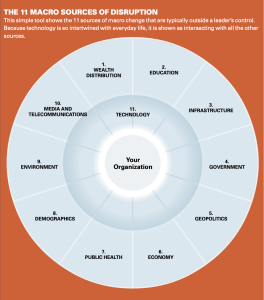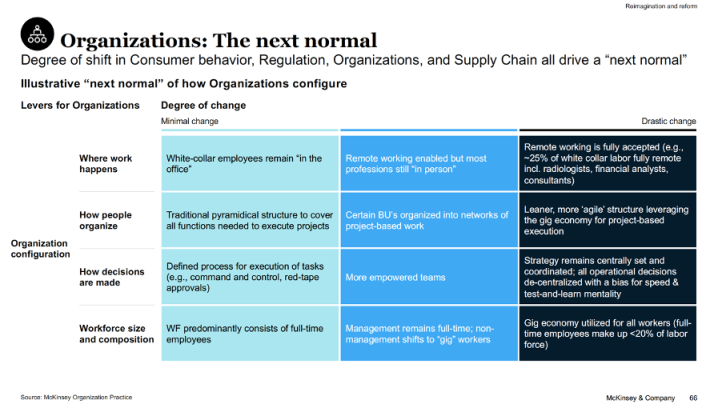As the pandemic slashes the global economy, I’ve started journaling and documenting the fertility of the crisis so I can go back to my own behaviour as a consumer look into the long-term changes that Covid-19 will bring upon us.
PSFK, as always, documents emerging trends (in April 2020) very thoroughly. These longer term themes will drive a “great reset” in attitudes, morals and behavior both on a personal and corporate level. Businesses that connect with the consumer around these themes will more likely flourish in the next normal:
- Customer Connection (not simply selling)
- Community Care
- Consumption Consequences
- Capacity to Convert
- Clear & Clean
- Concierge Convenience (store as service center: discovery, learning, connection, personalized)
As of December 2020, BCG is sharing the 5 consumer trends here to stay, shaping retail:
- Shifting time & money to home

- Income insecurity
- Health & cleanliness focus
- eCommerce acceleration
- Population shifts
Survival of the biggest: Coronavirus transforms retail
Summary from Axios, with key stats behind what we see: the titans of the retail industry — Amazon, Walmart, Target and Costco — are poised to come out of the coronavirus crisis even stronger and more formidable than they were before, as smaller rivals suffer and wither.
Learnings from previous recessions
Excellent analysis packed with research, by pi-datametrics, on How to Develop a Business Strategy for an economic downturn:
- HBR study: 85% market leaders get dislodged during a recession
- McKinsey research: resilient companies cut operating costs, divest business, focus on operational & financial flexibility
- Successful companies invest in Technology & Digital Business Tranformation during recession because of its lower opportunity cost. In the 11 macro sources of disruption, technology is so intertwined with everyday ilfe that it is intersecting the 10 other sources of disruption.

Telemedicine is the next boom:
In the same way that eCommerce took off in China after the 2003 SARS pandemic, the Economist Podcast Money Talk highlights (in the last segment) JD Health (not yet profitable) and that the Chinese government now allows online sale of prescription medicine. This reminded me of Youngme Moon, from After Hours podcast, narrating her teleconsultation experience and loving it.
The thesis is supported in Morning Brew as Mary Meeker Releases Coronavirus Trends Deck:
- Mary Meeker special coronavirus deck with her new firm Bond Capital (first spotted by Axios).
- Healthcare tech adoption curves that “would previously have taken months or years” have sped up to just days or weeks, tech analyst Benedict Evans notes. Telehealth, connected devices, rapid point-of-care diagnostics, and AI/automation in healthcare “will only accelerate,” Bond Capital predicts.
- VC Marc Andreessen published “It’s time to build,” a blog post 1) arguing that Western institutions’ bungled COVID-19 response stems from a failure of imagination, and 2) issuing a call to arms to “build” more innovation into manufacturing, transportation, urban planning, education, and government.
The unsung heroes of the COVID-19 crisis? Robots
Robots have been used for everything from disinfecting hospitals to walking the stage for graduation. Importantly, they’re not replacing people – they’re doing work people can no longer do safely.
FastCo’s Coronavirus butterfly effect: six predictions for a new world order
- The long emergency
“Precautionary savings and muted consumption will govern household spending decisions, and business investment will sag. A long-drawn-out W shape is therefore the most likely economic scenario for the years ahead. […] Numerous large firms will collapse or be consolidated. Industries from commercial real estate to aviation will suffer enormous write-downs on office buildings and shopping malls, airlines and airports.
[…] America’s single market is far more efficient than the eurozone, where leaders won’t agree to a sufficiently large mutualized debt scheme. As large employers (and the states or provinces that depend on their tax revenue) collapse, governments may fall.
- The “Suez scenario”
With U.S.-China trade trending sharply downward and China angling to re-price oil into renminbi, a fragmentation of the global monetary order is a possibility for which all countries should prepare.
- Another migrant crisis
Millions of other people will seek to escape “red zone” geographies with inadequate healthcare in favor of “green zones” with better medical care. At present, almost all the countries that offer universal medical care are in Europe. Within countries, the flight from expensive tier-one cities to more affordable provincial areas will likely accelerate. In America, they may benefit cities such as Denver and Charlotte; in Europe, Lisbon and Athens.
- Rising nationalism
The EU has a chance to bring about the fiscal union it needs more than ever, but it remains unclear whether it will take it. Asian countries have just passed a Regional Comprehensive Economic Partnership (RCEP) and will need to deepen their internal trade to cope with the global demand shock. North America’s three states already trade more with each other than with China or Europe. Regionalization will be the new globalization.
- Technology vs the cost curve
- Greater investment in biotechnology and healthcare are obvious places to start
- Private education will receive substantially more investment given its strong performance during the crisis, but with a focus on digital delivery.
- Digitization of financial services, which had already mushroomed prior to the pandemic, should be pushed to every living person in its wake.
- Civilization threats
The 14th-century Black Death caused millions of deaths across Eurasia, splintered the largest territorial empire ever known (the Mongols), forced significant wage growth in Europe, and promoted wider maritime exploration that led to European colonialism.
All the things COVID-19 will change forever, according to 30 top experts:
- Working from home: new normal? it depends
- Digital migration accelerates
- Education goes virtual
- Healthcare confronts old problems
- VC hunkers down
- Transportation rebounds, and evolves
- Manufacturing’s wake-up call
McKinsey Covid-19 report (published 3rd April 2020) highlights the Consumer and Organisations next normal based on Scenario planning for the economic impact of the Covid-19 crisis and provides a strategic crisis-action plan.


